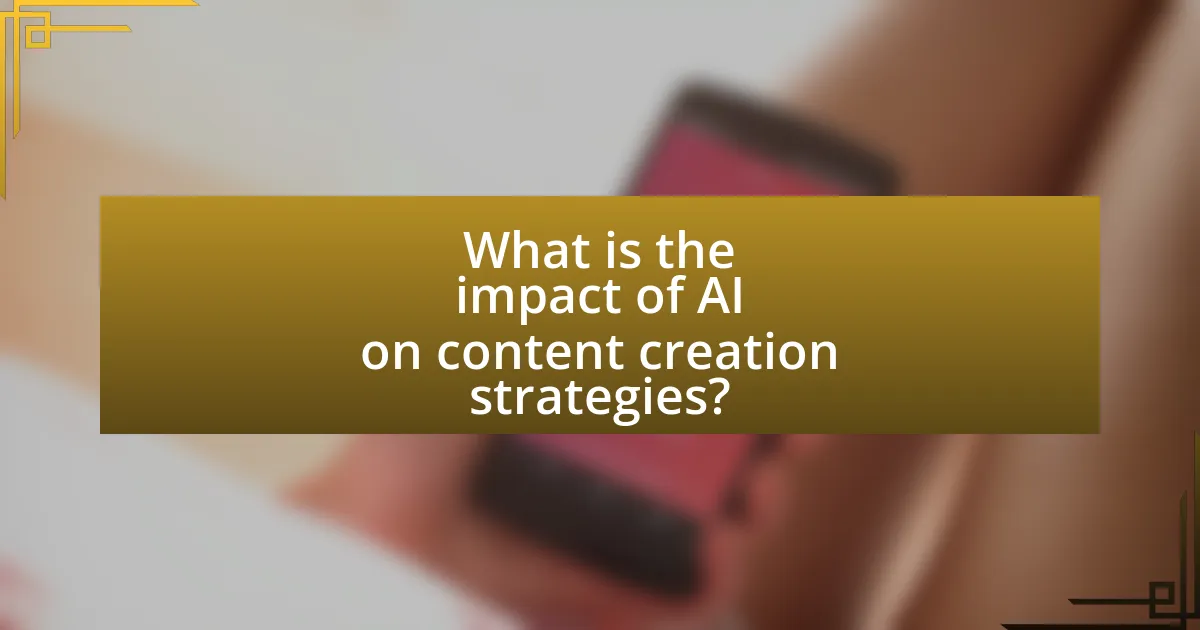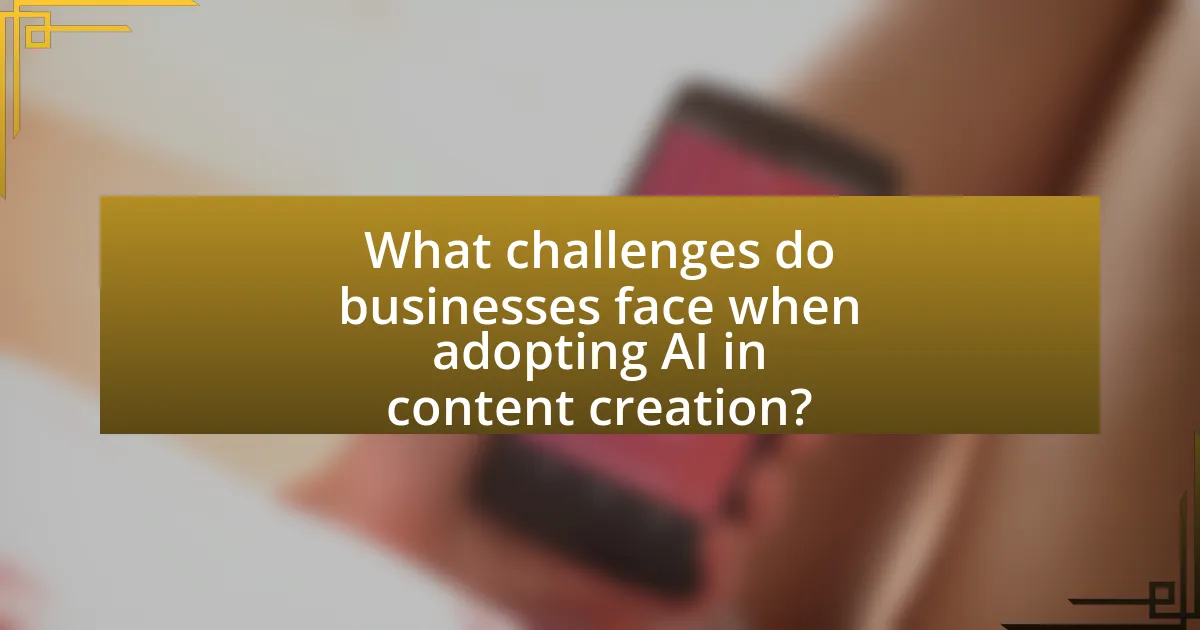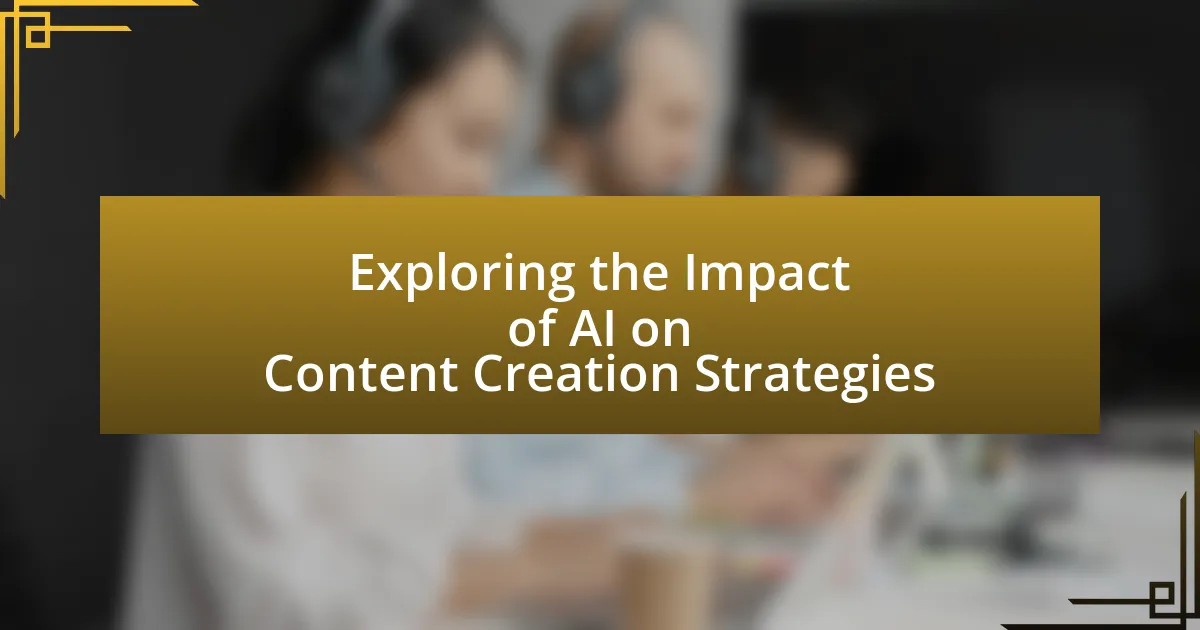The article explores the impact of artificial intelligence (AI) on content creation strategies, highlighting how AI enhances automation, personalization, and distribution optimization. It discusses specific AI technologies such as natural language processing and machine learning, which improve efficiency and creativity in content production. Key benefits of integrating AI include increased engagement rates, cost savings, and improved audience targeting. The article also addresses challenges businesses face when adopting AI, such as data quality and the need for skilled personnel, while providing insights on ethical considerations and best practices for effective implementation. Future trends in AI-driven content marketing, including enhanced personalization and collaboration between humans and AI, are also examined.

What is the impact of AI on content creation strategies?
AI significantly enhances content creation strategies by automating processes, improving personalization, and optimizing distribution. Automation allows for the rapid generation of text, images, and videos, which increases efficiency and reduces production time. For instance, tools like OpenAI’s GPT-3 can produce high-quality written content in seconds, enabling creators to focus on strategy rather than execution.
Moreover, AI-driven analytics provide insights into audience preferences, allowing for tailored content that resonates more effectively with target demographics. According to a study by McKinsey, companies that leverage AI for content personalization can see a 10-20% increase in engagement rates.
Additionally, AI tools can optimize content distribution by analyzing performance metrics and suggesting the best channels and times for posting, thereby maximizing reach and impact. This data-driven approach leads to more effective content strategies that align with audience behavior and preferences.
How has AI transformed traditional content creation methods?
AI has transformed traditional content creation methods by automating processes, enhancing personalization, and improving efficiency. Automation tools powered by AI, such as natural language generation and content optimization algorithms, allow creators to produce high-quality content at a faster rate. For instance, platforms like OpenAI’s GPT-3 can generate articles, blogs, and social media posts with minimal human intervention, significantly reducing the time required for content production. Additionally, AI-driven analytics enable content creators to tailor their work to specific audience preferences, increasing engagement and relevance. According to a report by McKinsey, companies that leverage AI in their content strategies can see productivity improvements of up to 40%. This shift not only streamlines workflows but also allows for more data-driven decision-making in content strategy.
What specific AI technologies are influencing content creation?
Specific AI technologies influencing content creation include natural language processing (NLP), machine learning algorithms, and generative adversarial networks (GANs). NLP enables automated content generation and sentiment analysis, allowing for the creation of articles, social media posts, and marketing copy that resonate with target audiences. Machine learning algorithms analyze user data to optimize content strategies and personalize user experiences, enhancing engagement. GANs are utilized for generating realistic images and videos, which can complement written content and improve visual storytelling. These technologies collectively enhance efficiency, creativity, and audience targeting in content creation.
How do these technologies enhance creativity and efficiency?
Technologies such as artificial intelligence enhance creativity and efficiency by automating repetitive tasks and providing data-driven insights. For instance, AI tools can analyze vast amounts of data to identify trends and generate content ideas, allowing creators to focus on more innovative aspects of their work. A study by McKinsey & Company found that AI can increase productivity by up to 40% in certain tasks, demonstrating its effectiveness in streamlining workflows. Additionally, AI-driven platforms can assist in content personalization, enabling creators to tailor their work to specific audience preferences, further enhancing engagement and creativity.
What are the key benefits of integrating AI into content strategies?
Integrating AI into content strategies enhances efficiency, personalization, and data-driven decision-making. AI tools can automate content creation, reducing the time and resources needed for production. For instance, AI-generated content can be produced at scale, allowing marketers to focus on strategy rather than manual tasks. Additionally, AI enables personalized content delivery by analyzing user behavior and preferences, which can increase engagement rates. According to a study by McKinsey, companies that leverage AI in marketing can achieve a 10-20% increase in revenue. Furthermore, AI analytics provide insights that help refine content strategies based on performance metrics, ensuring continuous improvement and alignment with audience needs.
How does AI improve audience targeting and engagement?
AI improves audience targeting and engagement by utilizing data analytics and machine learning algorithms to analyze user behavior and preferences. These technologies enable marketers to segment audiences more effectively, allowing for personalized content delivery that resonates with specific demographics. For instance, a study by McKinsey found that companies using AI for targeted marketing can increase their revenue by 10-20% due to enhanced customer engagement and satisfaction. By predicting user interests and optimizing content accordingly, AI significantly boosts the relevance of marketing efforts, leading to higher conversion rates and improved customer loyalty.
What cost savings can businesses expect from AI-driven content creation?
Businesses can expect significant cost savings from AI-driven content creation, potentially reducing content production costs by up to 50%. This reduction is primarily due to AI’s ability to automate repetitive tasks, such as generating articles, social media posts, and marketing materials, which traditionally require substantial human labor. For instance, a study by McKinsey found that automation can save companies up to $1.3 trillion annually in marketing and sales functions alone. Additionally, AI tools can enhance efficiency by producing high-quality content at a faster rate, allowing businesses to allocate resources more effectively and focus on strategic initiatives rather than manual content creation.

What challenges do businesses face when adopting AI in content creation?
Businesses face several challenges when adopting AI in content creation, including data quality issues, integration complexities, and the need for skilled personnel. Data quality is crucial, as AI systems require large amounts of high-quality data to generate relevant content; poor data can lead to inaccurate or irrelevant outputs. Integration complexities arise when businesses attempt to incorporate AI tools into existing workflows, which can disrupt established processes and require significant adjustments. Additionally, the lack of skilled personnel who understand both AI technology and content strategy can hinder effective implementation, as organizations may struggle to find or train employees capable of leveraging AI tools effectively. These challenges are supported by a report from McKinsey, which highlights that 70% of organizations cite talent shortages as a barrier to AI adoption.
How can organizations overcome resistance to AI adoption?
Organizations can overcome resistance to AI adoption by fostering a culture of openness and education around AI technologies. This involves providing comprehensive training programs that address employee concerns and demonstrate the benefits of AI, such as increased efficiency and enhanced creativity in content creation. Research indicates that organizations that invest in employee education about AI see a 30% increase in adoption rates, as employees feel more empowered and informed. Additionally, involving employees in the AI implementation process can reduce fear and resistance, as they become stakeholders in the change rather than passive recipients.
What training is necessary for teams to effectively use AI tools?
Teams require training in data literacy, AI tool functionality, and ethical considerations to effectively use AI tools. Data literacy enables team members to understand and interpret data, which is crucial for leveraging AI insights. Familiarity with the specific functionalities of AI tools ensures that teams can utilize features effectively, enhancing productivity and creativity. Additionally, training in ethical considerations helps teams navigate potential biases and ensure responsible AI usage. Research indicates that organizations investing in comprehensive AI training programs see a 30% increase in productivity and a 25% improvement in decision-making quality, underscoring the importance of targeted training for effective AI tool utilization.
How can businesses ensure ethical use of AI in content creation?
Businesses can ensure ethical use of AI in content creation by implementing clear guidelines and frameworks that prioritize transparency, accountability, and fairness. Establishing ethical standards involves creating policies that govern AI usage, ensuring that AI-generated content is clearly labeled, and maintaining human oversight in the content creation process. For instance, a study by the AI Ethics Lab emphasizes the importance of transparency in AI systems, stating that organizations should disclose the use of AI in content generation to foster trust and accountability. Additionally, businesses can conduct regular audits of AI systems to identify biases and ensure compliance with ethical standards, thereby promoting responsible AI practices in content creation.
What are the potential risks associated with AI-generated content?
The potential risks associated with AI-generated content include misinformation, lack of originality, and ethical concerns. Misinformation arises when AI systems generate content based on inaccurate or biased data, leading to the spread of false information. A study by MIT found that false news spreads six times faster than true news on social media, highlighting the risk of AI amplifying inaccuracies. Lack of originality is another risk, as AI-generated content often relies on existing data, which can result in repetitive or derivative material. Additionally, ethical concerns emerge regarding authorship and accountability, as it becomes challenging to determine who is responsible for the content produced by AI systems. These risks necessitate careful consideration and management in the use of AI for content creation.
How can misinformation be mitigated in AI-generated content?
Misinformation in AI-generated content can be mitigated through the implementation of robust verification systems and the use of transparent algorithms. Verification systems, such as fact-checking databases and cross-referencing with credible sources, can help ensure the accuracy of the information produced by AI. For instance, platforms like Snopes and FactCheck.org provide resources that can be integrated into AI systems to validate claims. Additionally, transparent algorithms that allow users to understand how content is generated can foster accountability and trust. Research indicates that AI models trained on diverse and high-quality datasets are less likely to propagate false information, as seen in studies by OpenAI and Stanford University, which emphasize the importance of data integrity in AI training processes.
What are the implications of copyright issues with AI content?
Copyright issues with AI content primarily involve the ownership and originality of generated works. As AI systems create content, determining whether the output is an original creation or a derivative of existing works becomes complex. For instance, if an AI model is trained on copyrighted material, the resulting content may infringe on the rights of the original creators, leading to potential legal disputes. Additionally, the lack of clear legal frameworks regarding AI-generated content complicates the enforcement of copyright laws, as current legislation often does not account for non-human creators. This ambiguity can result in uncertainty for businesses and individuals using AI for content creation, impacting their strategies and risk management in the digital landscape.

How can businesses effectively implement AI in their content strategies?
Businesses can effectively implement AI in their content strategies by leveraging AI tools for content generation, personalization, and analytics. AI-driven platforms, such as natural language processing algorithms, can automate content creation, enabling businesses to produce high-quality articles and social media posts at scale. For instance, a study by McKinsey found that companies using AI for content generation can increase productivity by up to 40%. Additionally, AI can analyze user data to personalize content, enhancing engagement and conversion rates. According to a report from Salesforce, 70% of consumers expect personalized experiences, which AI can facilitate by tailoring content to individual preferences. By integrating AI into their content strategies, businesses can optimize efficiency, improve user engagement, and drive better results.
What steps should organizations take to integrate AI tools?
Organizations should take the following steps to integrate AI tools: first, assess their specific needs and objectives to identify suitable AI applications. This involves conducting a thorough analysis of existing workflows and determining areas where AI can enhance efficiency or creativity. Next, organizations should invest in the necessary infrastructure, including hardware and software, to support AI implementation. Training employees on how to use AI tools effectively is crucial, as it ensures that staff can leverage these technologies to their full potential. Additionally, organizations must establish clear guidelines and ethical considerations for AI usage to mitigate risks associated with data privacy and bias. Finally, continuous evaluation and iteration of AI tools should be conducted to adapt to changing needs and improve performance. These steps are supported by research indicating that organizations that strategically align AI tools with their goals see a significant increase in productivity and innovation.
How can businesses measure the success of AI in their content strategies?
Businesses can measure the success of AI in their content strategies through key performance indicators (KPIs) such as engagement rates, conversion rates, and content reach. By analyzing metrics like click-through rates and social media shares, businesses can assess how well AI-generated content resonates with their audience. For instance, a study by McKinsey found that companies using AI in marketing saw a 10-20% increase in engagement, demonstrating the effectiveness of AI in enhancing content performance. Additionally, tracking customer feedback and sentiment analysis can provide insights into the qualitative impact of AI-driven content, further validating its success in achieving strategic goals.
What best practices should be followed for AI content creation?
Best practices for AI content creation include ensuring accuracy, maintaining originality, and optimizing for audience engagement. Accuracy is crucial as AI-generated content must be factually correct to build trust with readers; for instance, using reliable data sources and verifying information can prevent misinformation. Originality is essential to avoid plagiarism and ensure unique content; tools like plagiarism checkers can help maintain content integrity. Optimizing for audience engagement involves understanding target demographics and tailoring content to their preferences, which can be achieved through analytics and feedback mechanisms. These practices collectively enhance the effectiveness and credibility of AI-generated content.
What future trends can we expect in AI and content creation?
Future trends in AI and content creation include increased personalization, enhanced automation, and improved collaboration between humans and AI. Personalization will leverage AI algorithms to analyze user data, enabling the creation of tailored content that resonates with specific audiences. Enhanced automation will streamline content generation processes, allowing for faster production and distribution, as seen with tools like OpenAI’s GPT-3, which can generate coherent text based on prompts. Improved collaboration will involve AI acting as a creative partner, assisting content creators in brainstorming and refining ideas, thus fostering innovation in storytelling and engagement strategies. These trends are supported by the growing adoption of AI technologies in various industries, indicating a shift towards more efficient and effective content creation practices.
How will advancements in AI shape the future of content marketing?
Advancements in AI will significantly enhance content marketing by enabling personalized content creation and data-driven decision-making. AI technologies, such as natural language processing and machine learning, allow marketers to analyze consumer behavior and preferences at scale, leading to tailored content that resonates with specific audiences. For instance, a study by McKinsey found that companies using AI for personalization can achieve a 10-20% increase in sales. Additionally, AI tools can automate content generation, optimize distribution channels, and improve engagement metrics, thereby streamlining marketing efforts and maximizing ROI.
What role will personalization play in AI-driven content strategies?
Personalization will be a critical component of AI-driven content strategies, as it enables the delivery of tailored experiences to individual users based on their preferences and behaviors. By leveraging data analytics and machine learning algorithms, AI can analyze user interactions and demographics to create customized content that resonates with specific audiences. For instance, a study by McKinsey & Company found that personalized content can lead to a 10-15% increase in engagement rates, demonstrating the effectiveness of personalization in enhancing user experience and driving conversions.
What practical tips can enhance AI-driven content creation strategies?
To enhance AI-driven content creation strategies, implement a structured approach that includes data-driven insights, audience analysis, and iterative feedback loops. Utilizing analytics tools allows content creators to understand audience preferences and engagement metrics, which can guide the development of relevant and impactful content. For instance, a study by HubSpot found that companies using data analytics in their content strategy saw a 20% increase in engagement rates. Additionally, incorporating AI tools for content generation can streamline the writing process, enabling faster production while maintaining quality. Regularly soliciting feedback from users can further refine content strategies, ensuring alignment with audience needs and preferences.

Leave a Reply